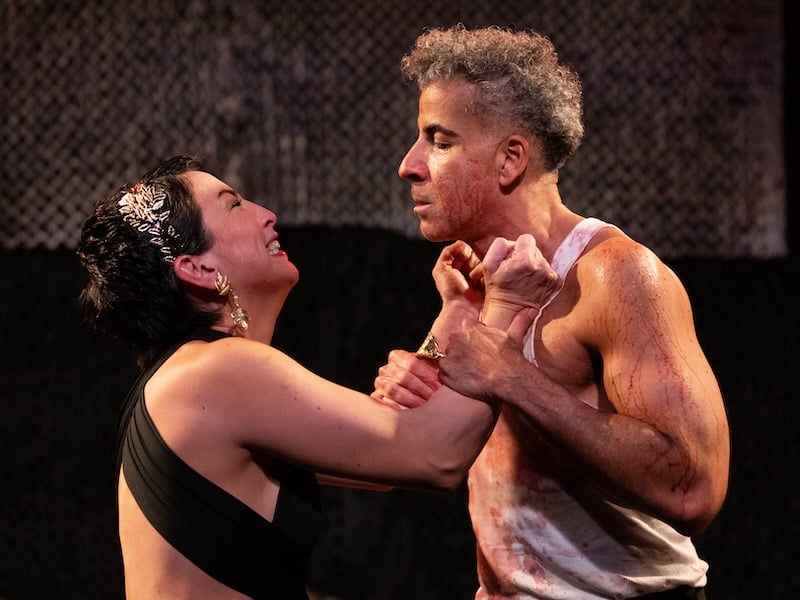The experience of Ajax at Scena Theatre, known for plays with international themes, feels like two plays in two different worlds. It starts out as a heightened fever dream in a world of gods and heroes, with a war hero’s PTSD during the Trojan War. It ends with solemn, grounded realism in the war’s aftermath in a world of kings, as the fight for a proper burial for the fallen Ajax takes center stage. Throughout, the common thread is that the whole production is harrowing, haunting, and shines most in moments of conflict.
In this modern reimagining of Sophocles’ classic Greek tragedy, which explores the fate of Trojan War hero Ajax, Scena Theatre draws parallels between the Trojan War and modern wars in the Middle East. Described by artistic director Robert McNamara in a program note as an “American Ajax,” this production, using John Tipton’s 2008 translation, conveys the neverending American war experience: what war does to one’s psyche and how it has residual effects on loved ones when soldiers return home. Beyond this mission, this production succeeds because it takes a powerful approach that incorporates wild aesthetic choices to enhance the message while not taking away from its humanist core meaning.

Such aesthetic choices are present in the actors’ performances. When we meet Ajax, he’s a flurry of energy murdering the spoils of war because after the hero Achilles’ death, he has not been awarded Achilles’ armor — which he believes he is most worthy of receiving. Instead, the hero Odysseus (a cool, collected Ian Blackwell Rogers) is favored by the kings, and by the goddess Athena (an ethereal Ellie Nicoll). Ajax goes through an emotional journey that ultimately ends in his untimely suicide, leaving behind his wife Tecmessa, portrayed by Fran Tapia, who is heartbreaking and fierce in her failed efforts for Ajax to continue living for her, and their son Eurysaces (also Nicoll).
As Ajax, Oscar Ceville comes in like a storm and goes out with strength. Battered and bloodied, with screams that read more as awful pain than battle cry, his intensity is palpable. Ceville is insane yet calculated. His Ajax is not only an “action hero” — he is a survivor. When Ajax goes, it’s a shame if one wants to understand Ajax before he has to be in survival mode; all we get to see of him in the show is the aftermath of war. It’s a haunting portrayal.
He leaves his brother Teucer to pick up the pieces and fight for his proper burial. As Teucer, Eli El carries the second half of the show. El displays resolute strength and determination for justice in his grounded interactions with Kim Curtis as the king Menelaus (in one moment, they play tug of war with Ajax’s corpse) and with Robert McNamara himself as the king Agamemnon. El must convince both of them to let proper burial rites occur; it’s only thanks to Odysseus that anything happens. All four men’s commitment makes the production more present and the conflicts more real, with a clear story about respect and honor for soldiers’ service.

This production also uses a Greek chorus that sings in addition to narrating the tale (Jessica Cooperstock, David Johnson, and Oscar Salvador Jr.). The trio mournfully sings atonal and dissonant harmonies to highlight tensions as background music, and tagteam narration with split lines with flowery speech. They also create sound effects live. This heightened presence is more frequent in the first half. This makes the beginning harder to grasp if you’re not familiar with the original myth, as this choice dominates the production’s feel and results in some lack of clarity in what the conflict is. Be advised that you should read up on the story beforehand because your brain may have to work harder to understand Ajax’s present — though that might be the point. Ajax has been so affected by PTSD that a swirling world of cacophony is all around him.
This cacophony is furthered by an awesome echo in the sound design by Denise Rose. One mic hanging from above the stage picks up all the sound in the space, with reverb amped up at pivotal moments to provide a booming echo for the gods and heroes for an epic feel. In a way, it evokes the feeling of being in a dark cave waiting for Ajax’s burial the whole time already.
On the other end of “assuming death,” the production makes the aesthetic choice to not use any physical weapons in fights, perhaps out of respect for what it says about PTSD. Every act of violence, including the first scene where Ajax kills everyone onstage and Ajax’s suicide, is fully endowed and brings a sense of danger and urgency (coordinated by Paul Gallagher), but is never carried out with a real sword or gun. This contrasts with the decision to use projections (by Sean Preston) that occasionally physically place us in the worlds of Iraq and Afghanistan, and a set design (by Michael C. Stepowany) covering the upstage wall with construction netting that evokes concealment and camouflage.
This show was a classic “let’s do Greek theater in a cool and edgy way with added music” type of staging, in a design that was “let’s go PTSD about this and really hammer home the war feel.” Ultimately, this production was well-performed and well-designed, and an interesting aesthetic was matched with timelessly powerful performances from local performers.
Running Time: 90 minutes, no intermission.
Ajax plays through February 9, 2025, presented by Scena Theatre, performing in the Lab Theatre II at Atlas Performing Arts Center, 1333 H St NE, Washington, DC. Showtimes are Thursday-Saturday at 7:30 PM and Sunday at 2:30 PM. To purchase tickets ($45 general admission; $30 military, veterans, and seniors with ID; $25 students), call the box office at 202-399-7993, email boxoffice@atlasarts.org, or go online.
Content Warning: Mild use of swearing or coarse language; mild depictions of self harm, violence, suicide, grief, and smoking; mild use of weapons. Recommended for ages 13+.
Ajax
Written by Sophocles
Translated by John Tipton
A Scena Theatre production directed by Robert McNamara
CAST (in order of appearance)
Athena: Ellie Nicoll
Odysseus: Ian Blackwell Rogers
Ajax: Oscar Ceville
Chorus 1: Oscar Salvador Jr.
Chorus 2: David Johnson
Chorus 3: Jessica Cooperstock
Tecmessa: Fran Tapia
Eurysaces: Ellie Nicol
Messenger: Eli El
Teucer: Eli El
Menelaus: Kim Curtis
Agamemnon: Robert McNamara
DESIGN TEAM
Artistic Director: Robert McNamara
Scenic Designer: Michael C. Stepowany
Lighting Designer: Marianne Meadows
Costume Designer: Mei Chen
Sound Designer: Denise Rose
Projections Designer: Sean Preston
Vocal Consultant: Sissel Bakken
Choreography and Movement Coach: Robert McNamara
Movement Consultant: Kim Curtis
Fight Director: Paul Gallagher
Stage Manager: Kaitlyn Dorsey
Assistant Director/Dramaturg: Anne Nottage
SEE ALSO:
Scena Theatre reimagines Greek tragedy ‘Ajax’ at Atlas (news story, December 20, 2025)



